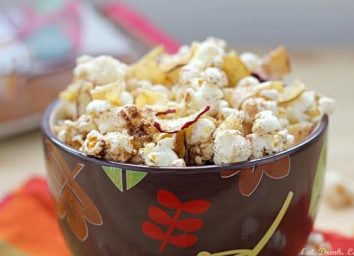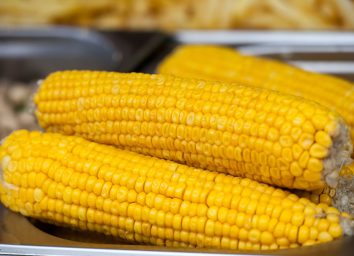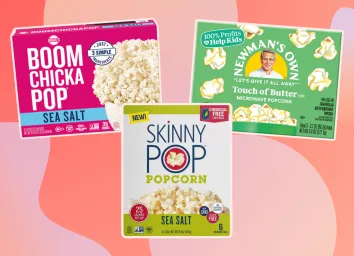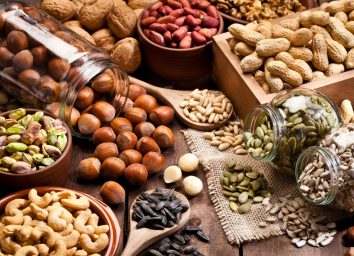Is Popcorn Healthy? Registered Dietitians Weigh in Once and for All
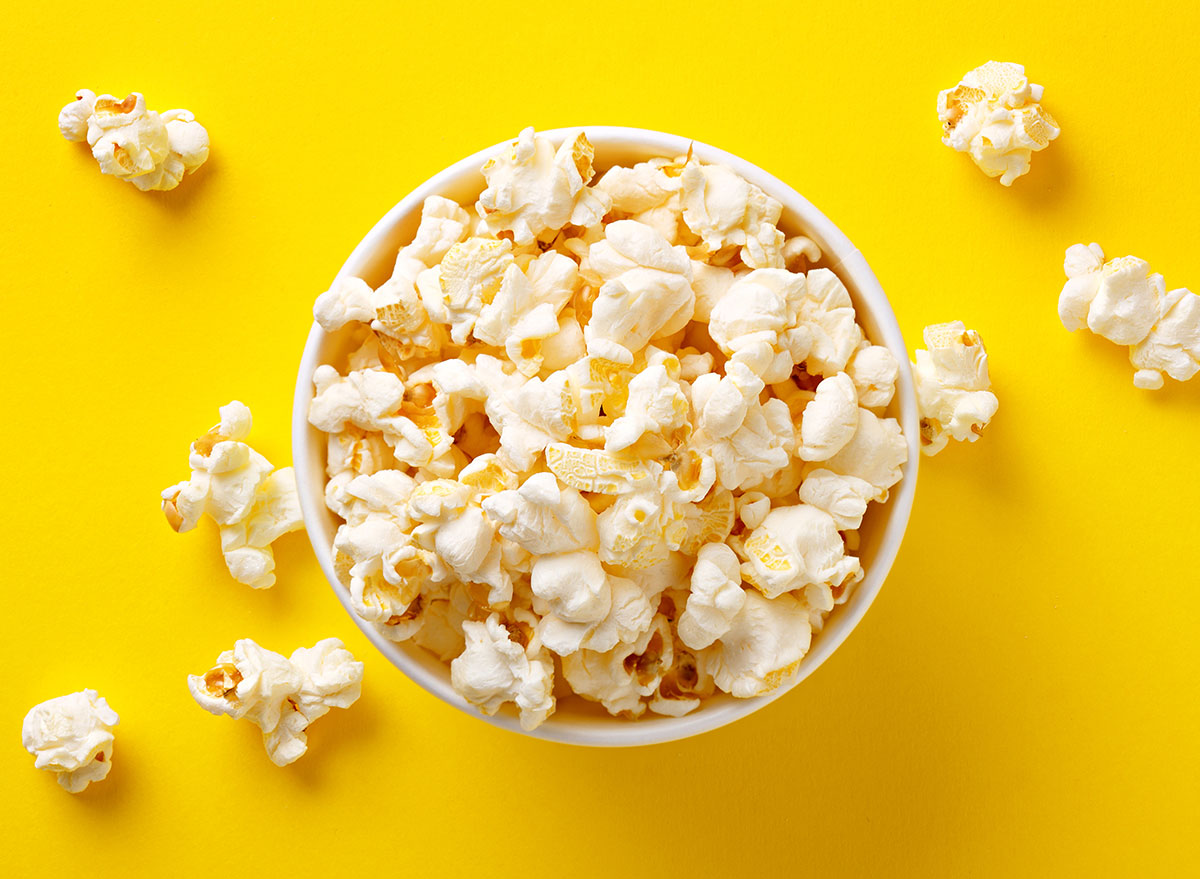
Popcorn is often thought of as a light snack many turn to when they're trying to find something low in calories to munch on that is still filling and, well, simply tastes good. But, in actuality, is popcorn healthy for you?
According to nutritional experts, the answer to whether popcorn is a legitimately healthy snack or not is a bit of a mixed bag.
"When it comes to snacks, I like to think of the 3 Bs: Bad, Better, and Best," says Nealy Fischer, founder of The Flexible Chef and author of Food You Want for the Life You Crave. "When it's not drenched in movie-theater butter, caked in sugary caramel sauce, or hidden under globs of chocolate," she continues, "I would call it a better-for-you snack option." So that leads us to…
What are the health benefits of popcorn?
Rich in nutrients like protein and iron, popcorn also has B complex vitamins and some minerals like magnesium and manganese. Popcorn is also packed with fiber—about four grams per three cups—which Amber Nash, founder of FitHealthyBest.com, notes is a nutrient that only 5 percent of the American population is getting enough of, according to national consumption surveys. Increased fiber intake has been associated with lower instances of heart disease, stroke, diabetes, and some cancers, and Rachel Fine, RD, registered dietitian, and owner of To The Pointe Nutrition, notes that fiber has also been linked to improved gut health. A prebiotic, fiber is a great food source for healthy gut bacteria, thus helping to promote and maintain healthy gut flora.
Maintaining gut health is essential to improving physical and mental health on the whole: the benefits of healthy gut flora include improved digestion and mood and even a reduction in general inflammation. In addition to its myriad of health benefits, popcorn is also a great snack for people who have a hard time feeling full or satiated.
"Aside from the benefits of being inexpensive and easy to prepare, popcorn offers a large volume for few calories," explains Summer Yule, MS, RDN.
And the physical feeling of satiety is only half of it. Sora Vernikoff, a No Diet coach and the author of Eat What You Want! Stop When You Want! A No-Diet, Weight-Loss Program, notes that popcorn can help overeaters manage cravings.
"Aside from health issues, overeaters need heavy hand to mouth experiences when they want to binge or overeat," she says. "So from that perspective, I do recommend going to popcorn."
What makes popcorn unhealthy?
Despite popcorn's impressive nutritional profile, in most contexts, popcorn ends up becoming a poor snack choice.
"While popcorn is a healthy snack it can quickly become unhealthy by the common additives that are used to give it flavor," says Lisa Richards, nutritionist and author of The Candida Diet. "Loading butter on popcorn adds a ton of extra calories and fat which significantly lower the food's benefits. Adding sodium-rich flavorings can make popcorn unhealthy as well."
Butter, but also cheese and caramel, add empty calories that turn this snack from a healthy choice into a not-so-healthy one. There's also the question of the microwave bags popcorn is so often prepared in. These bags are usually coated in perfluorinated compounds (PFCs). When heated, these chemicals break down into perfluorooctanoic acid (PFOA), a compound that has been linked to increased risk of cancer.
There are also some people who would do well to stay away from popcorn entirely—whether it's coated in unhealthy toppings or not. Lori Shemek, PhD, CNC, author of How to Fight FATflammation! notes that popcorn can lead to an increased chance of inflammation, and being a high-starch, high-carb food, it certainly isn't right for people on low-carb diets like keto.
"Remember," she says, "popcorn is a grain, and many individuals have trouble metabolizing grains."
Functional Medicine Nutritionist Nancy Guberti adds that popcorn can be difficult to digest, causing cramps, abdominal pain, and gas. If popcorn causes you digestive discomfort, she recommends popped sorghum or quinoa instead.
How can you make popcorn a super healthy snack?
The secret to enjoying popcorn as a healthy snack is pretty simple! The first step is to choose the very best popcorn you can find. Pick organic varieties whenever possible; when organic is unavailable, be sure to at least opt for non-GMO. Next, cook it properly: on the stovetop, or air-popped. These methods don't add additional chemicals or calories.
Finally, choose a selection of good-for-you toppings:
Healthy Fats
If you're going to add butter to your popcorn, go for grass-fed. Grass-fed butter is a good source of vitamins A and K2, and it also contains conjugated linoleic acid, or CLA, a healthy fatty acid that has actually been linked to weight loss. You could also opt for ghee, a clarified version of butter entirely devoid of lactose, or coconut oil, which has been shown to lower bad cholesterol and reduce risk of heart disease. Or go super-indulgent with truffle-infused extra-virgin olive oil, known for its heart health benefits.
Superfoods
Popcorn can be flavored with a variety of superfoods. Try turmeric or curry powder, rich in anti-inflammatory curcumin, or antioxidant-rich cinnamon or raw cacao, for something a bit sweeter. Nutritional yeast boasts a cheesy flavor and is rich in protein and B vitamins, and seaweed flakes add a touch of brininess and a load of iodine and tyrosine, which support healthy thyroid function. If you need a hint of salt, opt for mineral-rich pink Himalayan sea salt or red Hawaiian volcanic salt.
Manage Your Serving Size
While it's possible to eat large quantities of popcorn without ingesting a phenomenal number of calories, remember that a little goes a long way. One ounce of unpopped popcorn kernels may not look like much (about 2 tablespoons), but when popped, it will make about four cups of popcorn at just over 100 calories—more than enough for a healthy snack.
